
In addition to examining U.S. Jews, the survey provides data on Americans who have a connection to Judaism but who are not classified as Jewish in this report. These respondents fall into two categories: people of Jewish background and people of Jewish affinity.
All people of Jewish background either were raised Jewish or had at least one Jewish parent. But they are not included in the Jewish population for the purposes of this report because they do not currently think of themselves as Jewish, or if they do identify as Jewish they also identify with a religion other than Judaism, including a few who identify religiously both as Jewish and with another religion. Nearly half of people in this category (46%) do not describe themselves as Jewish in any way (either by religion or aside from religion) or did not answer the question, while the remainder (54%) do identify as Jewish in some way but also identify with a religion other than Judaism. Overall, about half of Americans in the Jewish background category (52%) say they are Christians.
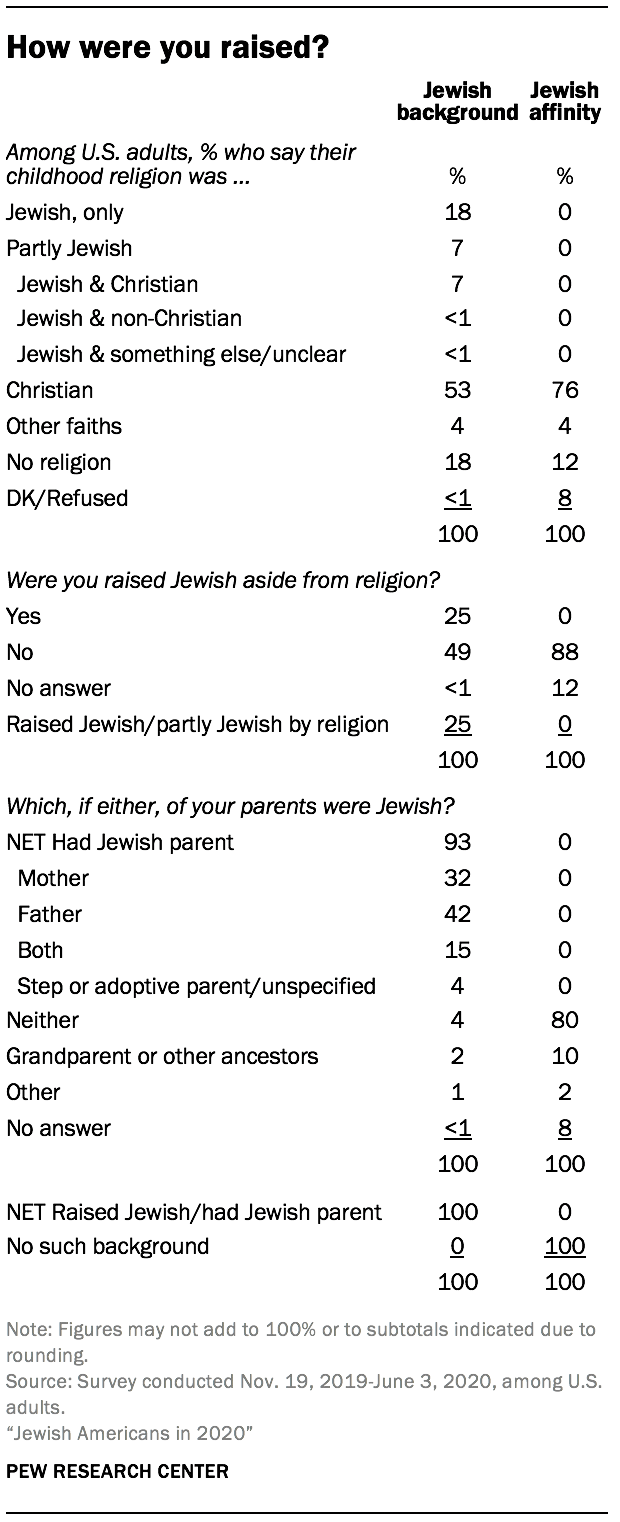
All respondents who are categorized as people of Jewish affinity describe themselves as Jewish in some way, either by religion or aside from religion. But they are not included in the Jewish population for the purposes of this report because no one in this group is exclusively Jewish by religion (some describe their religion as both Judaism and something else, including Messianic Jews), and none of them were raised Jewish or have a Jewish parent.48
Most people in the Jewish affinity category (76%) were raised Christian, including 2% who say they were raised in Messianic Judaism; the share who say they are Messianic Jews today is somewhat larger (8%).
More than nine-in-ten people of Jewish background say had at least one Jewish parent, but only about one-in-five (18%) say they were raised exclusively Jewish by religion. More than half (57%) say they were raised exclusively in a religion other than Judaism, most commonly Christianity (53%).
This chapter examines the religious beliefs and practices, Jewish connections, political attitudes and demographic characteristics of Americans of Jewish background and Jewish affinity, including some measures on which they are similar to Jews of no religion, such as low levels of engagement with Jewish practices and relatively weak feelings of belonging to the Jewish people, and some measures on which they are closer to Jews by religion, such as support for Israel.
Religious beliefs and practices
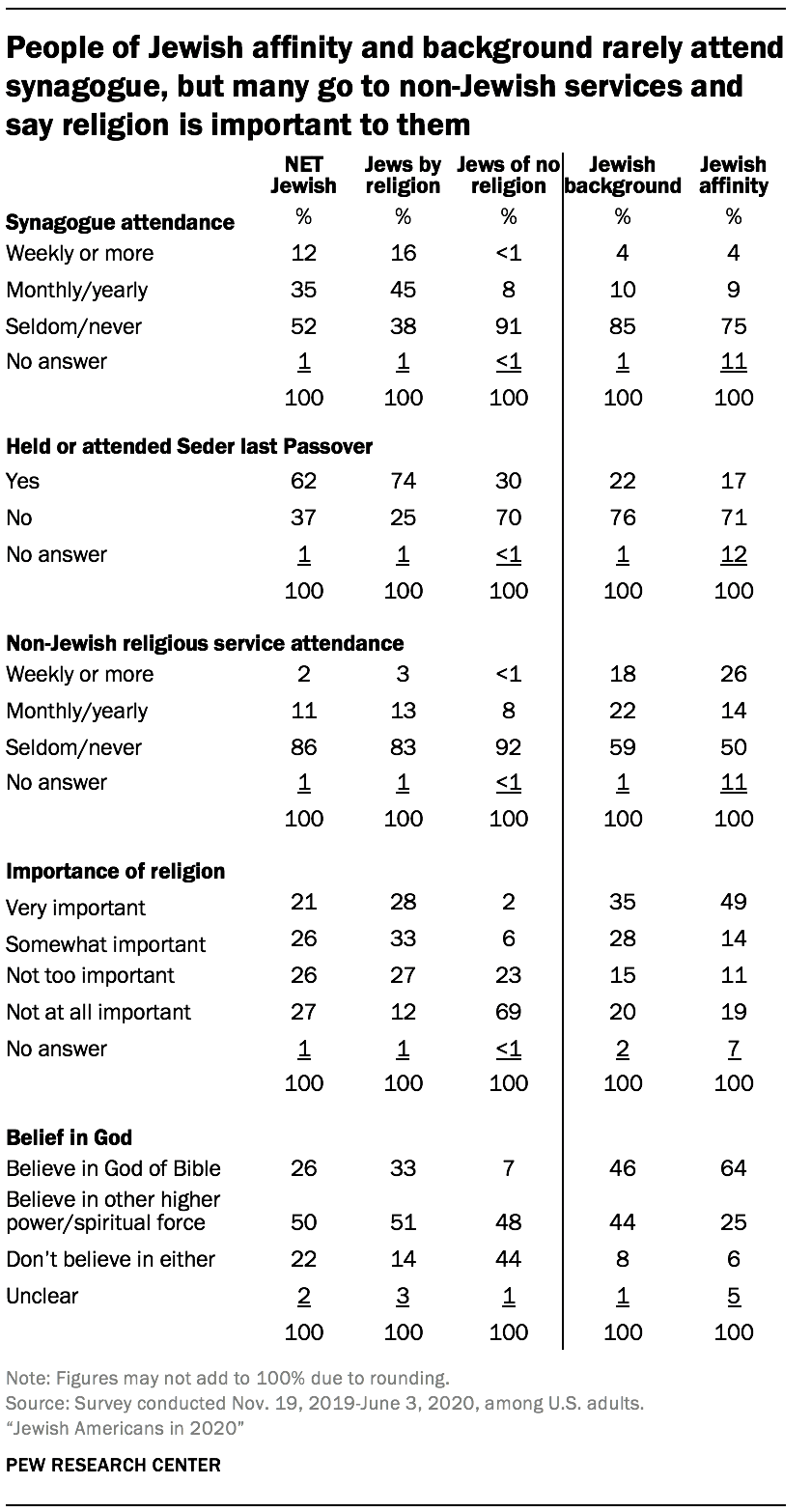
Relatively few people of Jewish background and affinity regularly go to a synagogue, temple, havurah or independent minyan. In fact, three-quarters of people in the Jewish affinity category and more than eight-in-ten people of Jewish background (85%) say they seldom or never attend Jewish religious services. An even higher share of Jews of no religion (92%) say the same. By comparison, most Jews by religion say they attend synagogue at least a few times a year.
In keeping with their low levels of synagogue attendance, people of Jewish background and affinity are less likely than both Jews of no religion and Jews by religion to celebrate Jewish holidays. For example, 17% of Americans with Jewish affinity and 22% of those with a Jewish background attended a Seder in the year prior to the survey – fewer than the 30% of Jews of no religion who held or attended a ritual meal at Passover, and far fewer than the three-quarters (74%) of Jews by religion who did the same.
At the same time, people of Jewish background and affinity are much more likely to attend non–Jewish religious services than they are to attend a synagogue, with roughly four-in-ten in each group saying that they attend church or other non-Jewish services at least yearly.
People of Jewish background and affinity also are more likely than Jews to say religion is very important to them. Half of people of Jewish affinity (49%) say that religion is very important in their lives, while about one-third of people of Jewish background (35%) say the same. By comparison, about three-in-ten Jews by religion (28%) and only 2% of Jews of no religion say religion is very important in their lives.
Similarly, people of Jewish background and affinity are more inclined to believe in the God of the Bible than are survey respondents in either Jewish category. Nearly half of people of Jewish background (46%) and roughly two-thirds of people of Jewish affinity (64%) say they believe in God as described in the Bible. This compares with a third of Jews by religion and just 7% of Jews of no religion who express the same belief.
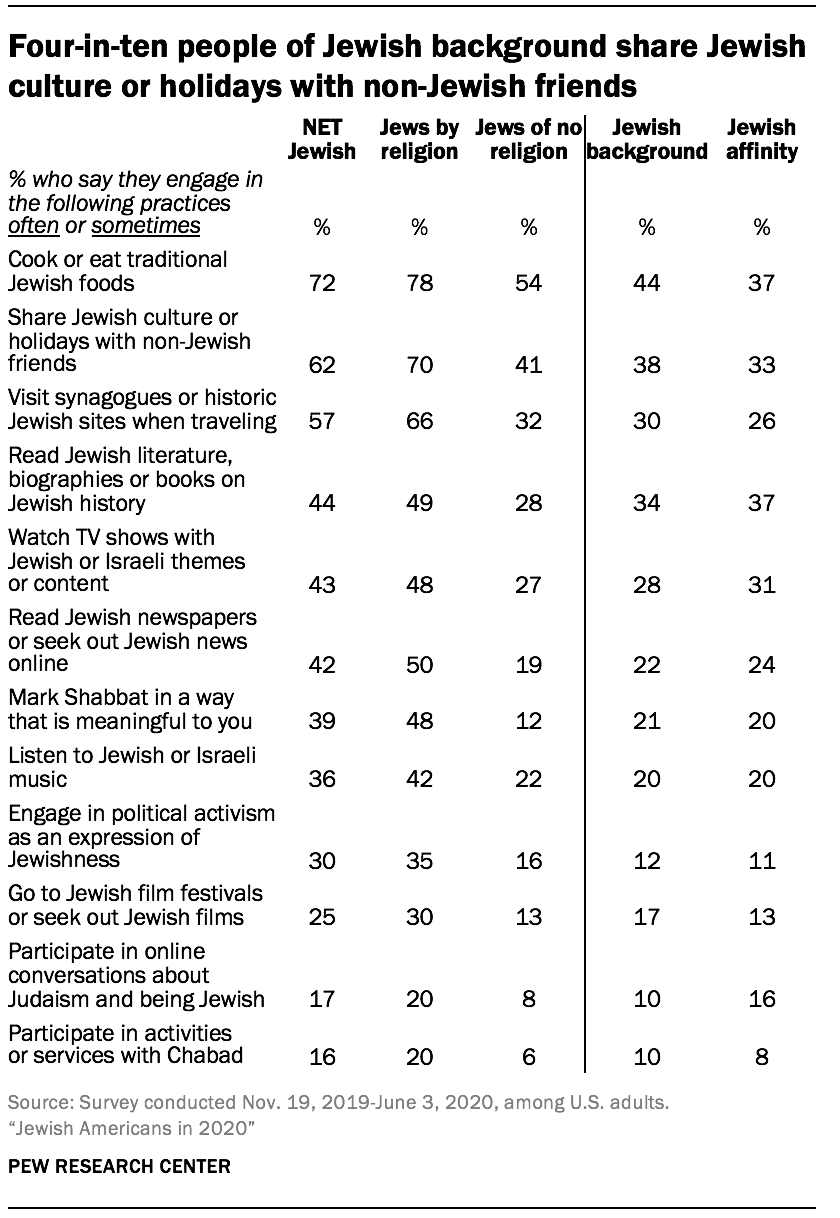
The survey also asked about engagement in 12 types of cultural Jewish activities or do-it-yourself religious practices, such as marking the Jewish Sabbath “in a way that makes it meaningful to you” (even if it is not in a traditional fashion). With just a few exceptions, a third or fewer of both people of Jewish background and people of Jewish affinity say they often or sometimes engage in these practices.
On many of these measures, people of Jewish background and affinity look much more like Jews of no religion than like Jews by religion. For example, 26% of people of Jewish affinity, 30% of people of Jewish background and 32% of Jews of no religion say they at least sometimes visit synagogues or historic Jewish sites when traveling, compared with two-thirds of Jews by religion.
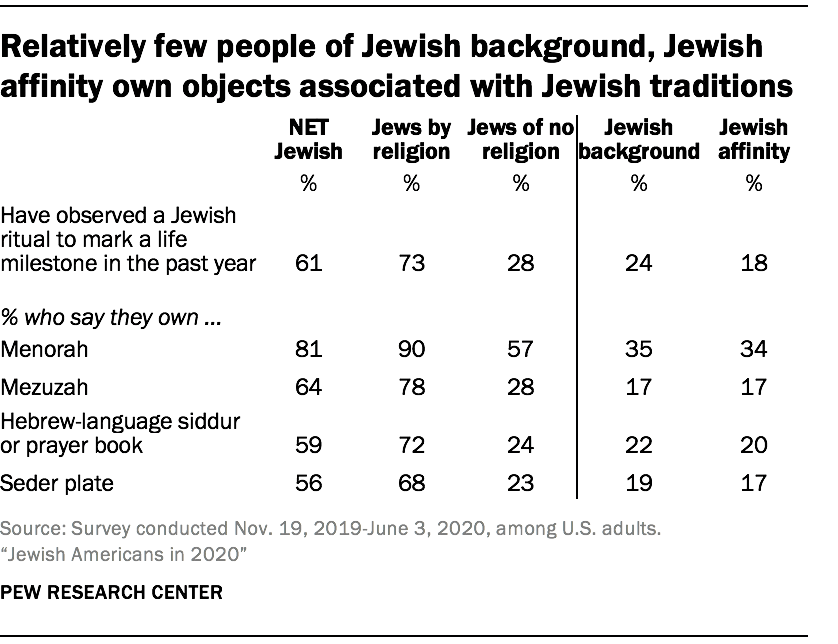
Similarly, 18% of survey respondents who have a Jewish affinity, 24% who have a Jewish background and 28% who are Jews of no religion say they observed a Jewish ritual to mark a life milestone in the past year. By contrast, nearly three-quarters of Jews by religion say they have done this (73%).
When asked whether they own various traditional Jewish objects, about a third of people in both the Jewish background category (35%) and the affinity category (34%) say they have a menorah, compared with 57% of Jews of no religion and 90% of Jews by religion. Smaller numbers of people of Jewish background and affinity have a Hebrew-language prayer book, a Seder plate or a mezuzah.
Jewish continuity
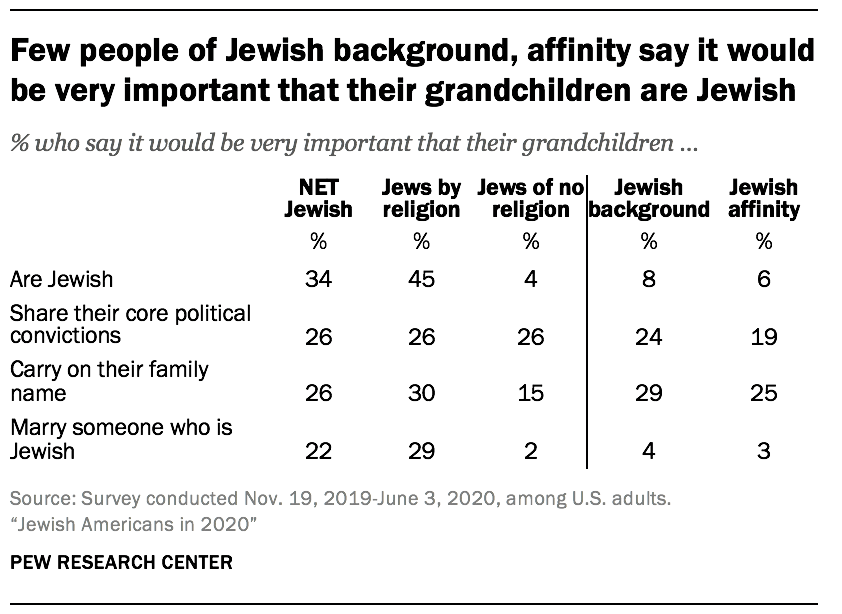
People of Jewish background and Jewish affinity mirror Jews of no religion and diverge from Jews by religion when it comes to their hopes for the Jewishness of their current or future grandchildren. Just 8% of people of Jewish background say it would be very important to them that their grandchildren are Jewish; 6% of people of Jewish affinity say the same, which is similar to the share of Jews of no religion (4%) who give this response. By contrast, 45% of Jews by religion say it would be very important to them that their grandchildren are Jewish. (This question was asked hypothetically of all respondents, regardless of whether they have any children or grandchildren, or intend to.)
In addition, roughly three-in-ten Jews by religion (29%) say it would be very important to them that their grandchildren marry someone who is Jewish, while very few Jews of no religion (2%), people of Jewish background (4%) and people of Jewish affinity (3%) share this perspective.
Jewish peoplehood
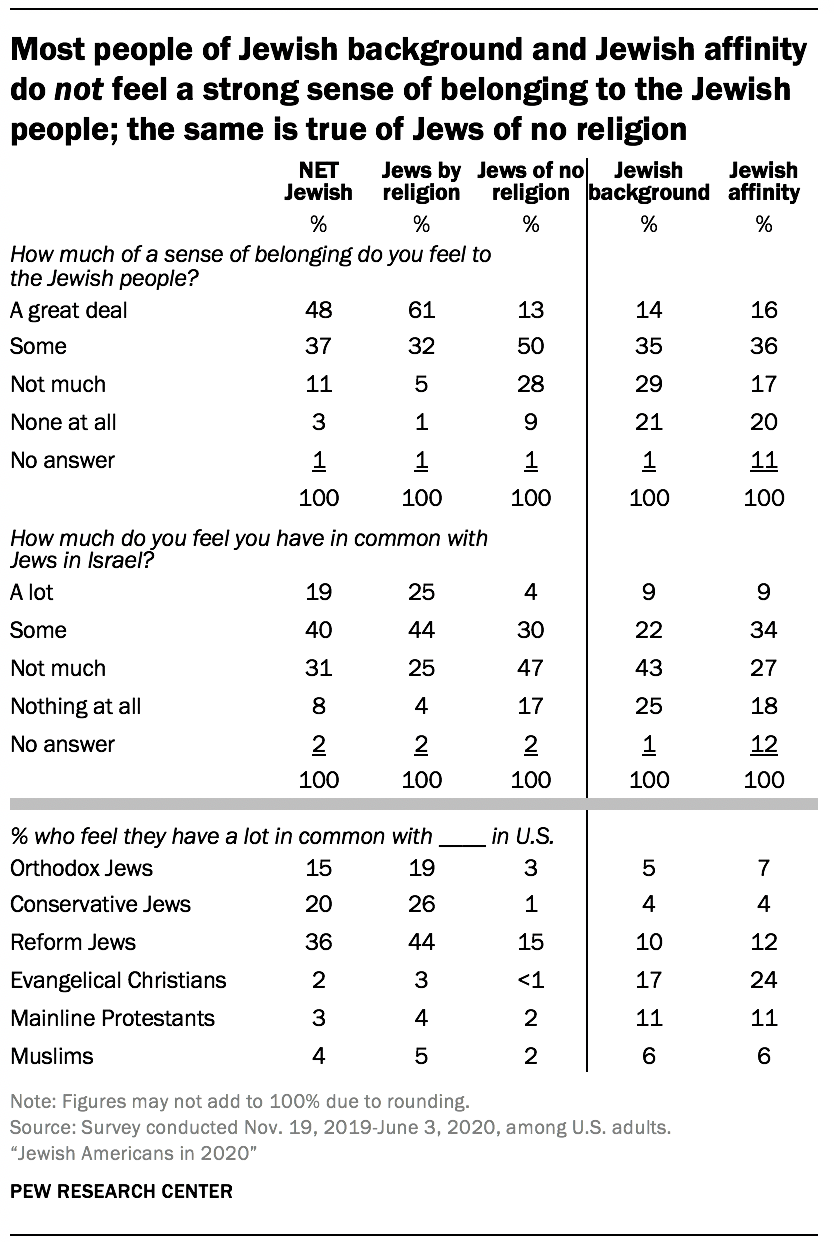
Just 14% of respondents of Jewish background and 16% of respondents of Jewish affinity say they feel “a great deal” of belonging to the Jewish people. This is on par with the percentage of Jews of no religion who share this feeling (13%) – although Jews of no religion are more likely to feel at least “some” sense of belonging, and less likely to feel “none at all.” By contrast, a majority of Jews by religion (61%) say they feel a great deal of belonging to the Jewish people.
Moreover, only 9% of people of Jewish background or affinity say they have a lot in common with Jews in Israel. The share of Jews of no religion who say this is even lower, at 4%, while fully a quarter of Jews by religion feel they have a lot in common with Jews in Israel.
When asked how much they feel they have in common with six religious groups (Orthodox Jews, Conservative Jews, Reform Jews, evangelical Christians, mainline Protestants and Muslims), 17% of people of Jewish background and about a quarter (24%) of people of Jewish affinity say they have a lot in common with evangelical Christians. Roughly one-in-ten or fewer in each group say they have a lot in common with mainline Protestants, Reform Jews, Orthodox Jews, Conservative Jews and Muslims.
Connections to Israel
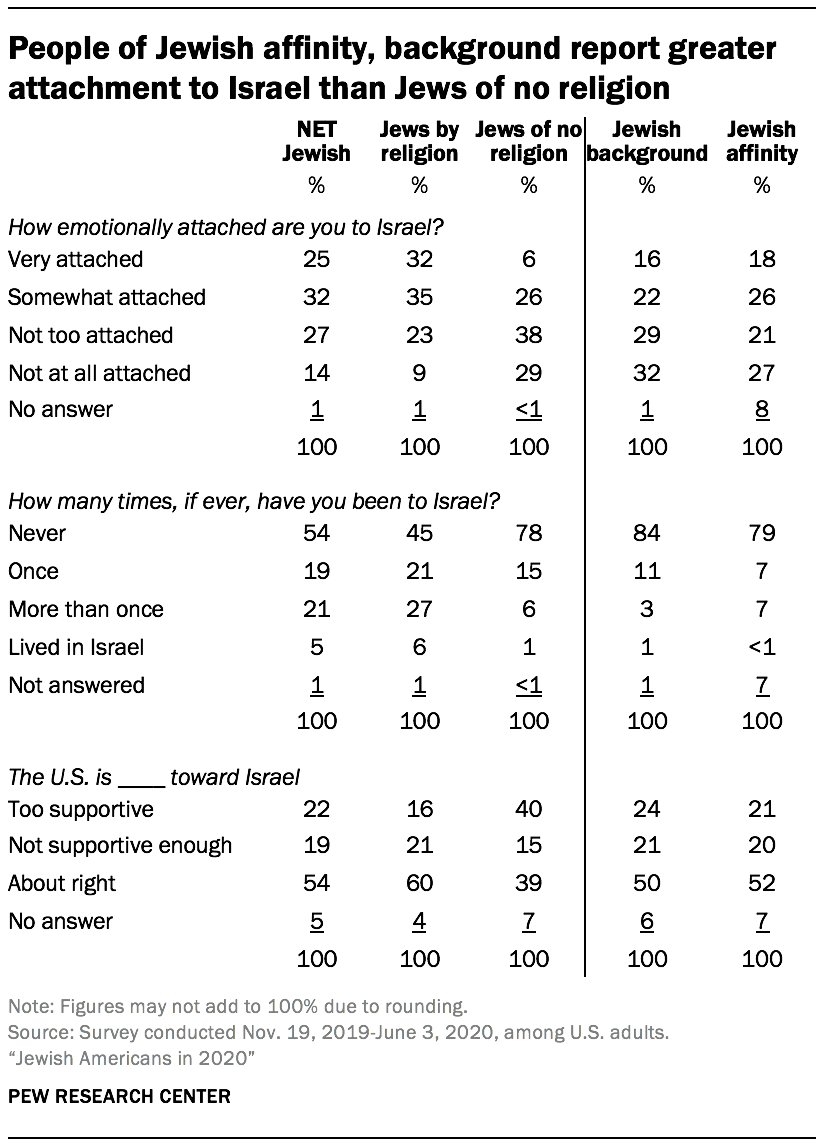
Americans of Jewish background and Jewish affinity are less likely than Jews by religion to say they are “very” emotionally attached to Israel, but they are more likely than Jews of no religion to say this. Overall, 38% of people of Jewish background and 44% of people of Jewish affinity say they are at least “somewhat” attached to Israel.
This is the case even though large majorities of Americans of Jewish background and Jewish affinity have never been to Israel (84% and 79%, respectively). By contrast, more than half of Jews by religion have been to the Jewish state.
Of all these groups, Jews of no religion were the most likely to say that the United States is “too supportive” of Israel, with 40% taking this position at the time of the survey, during the final 14 months of the Trump administration. By comparison, about a quarter of people of Jewish background (24%), one-in-five people of Jewish affinity (21%) and just 16% of Jews by religion said the U.S. was too supportive of Israel at the time of the survey. In the latter three categories, the most common answer was that the level of U.S. support for Israel was “about right,” while about one-in-five said the U.S. was “not supportive enough.”
Anti-Semitism
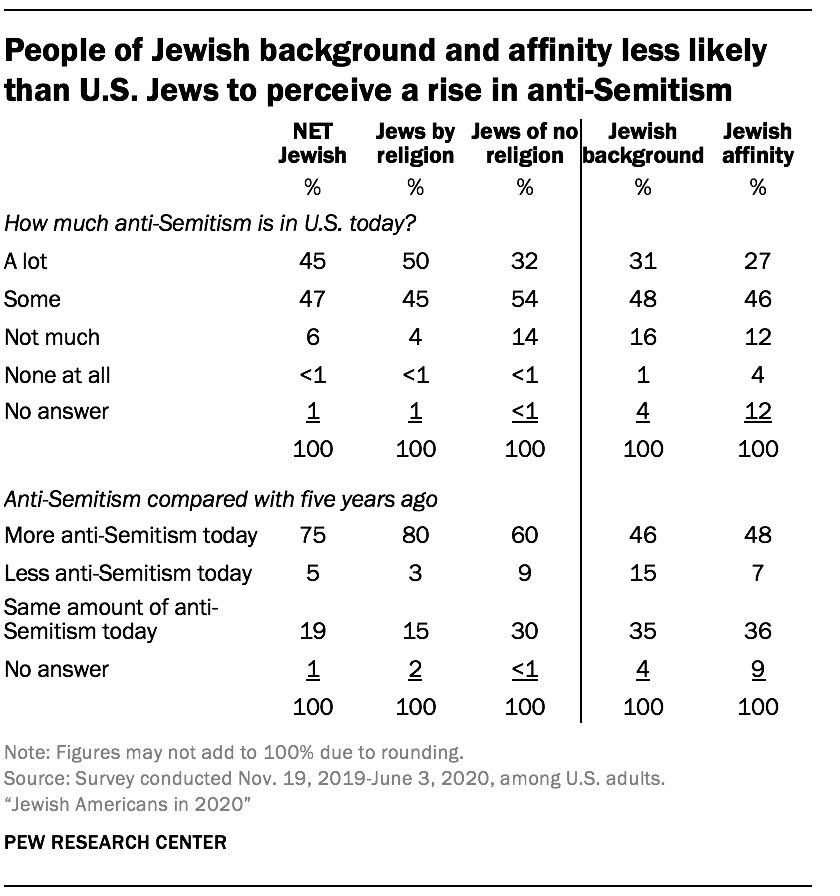
Jews by religion (50%) are more likely than Jews of no religion (32%), people of Jewish background (31%) and people of Jewish affinity (27%) to perceive a lot of anti-Semitism in America.
Compared with Jews by religion (80%) and Jews of no religion (60%), fewer Americans of Jewish background (46%) and those of Jewish affinity (48%) feel there is more anti-Semitism now than there was five years ago.
Party and ideology
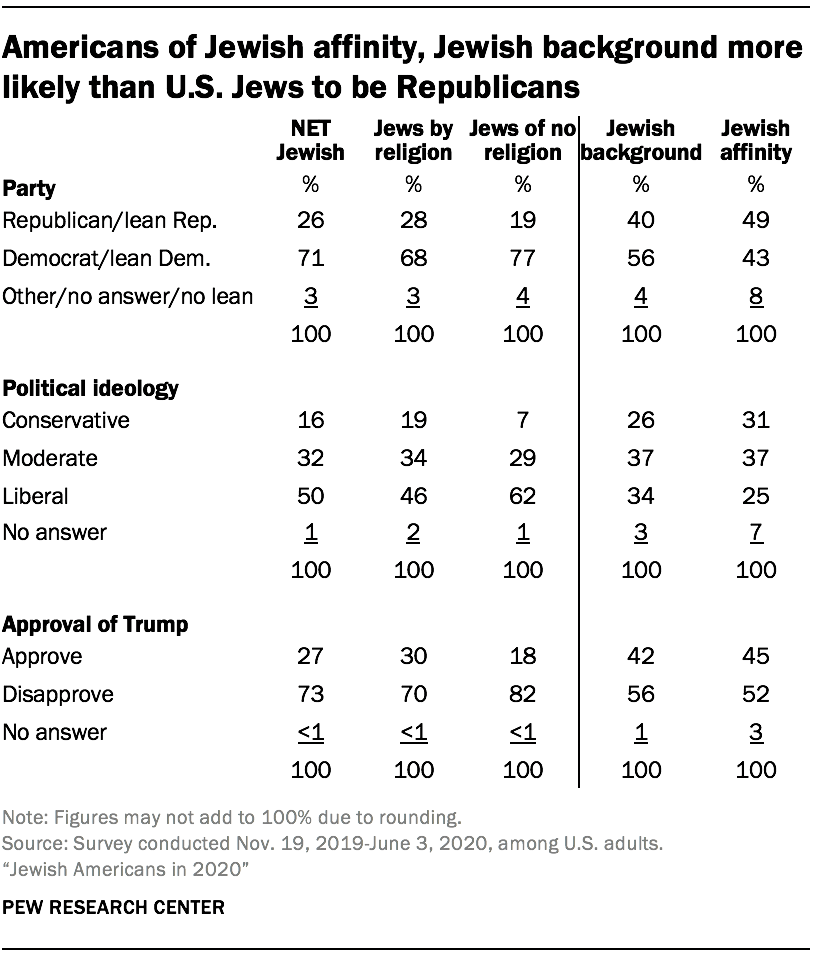
Americans in the Jewish background and Jewish affinity categories are much more likely than U.S. Jews to identify with the Republican Party and to describe themselves as politically conservative.
Four-in-ten respondents in the Jewish background category and roughly half in the Jewish affinity category (49%) say they identify with or lean toward the Republican Party, compared with just a quarter of Jewish Americans overall (26%). And a quarter or more of respondents of Jewish background (26%) and Jewish affinity (31%) describe their political ideology as conservative, while just 16% of U.S. Jews describe themselves this way. Conversely, half of all Jewish Americans describe their ideology as liberal, compared with just 34% of people of Jewish background and 25% of those of Jewish affinity.
In line with their higher rates of conservatism and identification with the Republican Party, people in the Jewish affinity and Jewish background categories were more inclined than U.S. Jews overall to approve of the job Donald Trump was doing as president at the time the survey was conducted, roughly five to 12 months before the 2020 presidential election (45% of the affinity group and 42% of the background group gave a positive rating vs. 30% of Jews by religion and just 18% of Jews of no religion).
Demographics
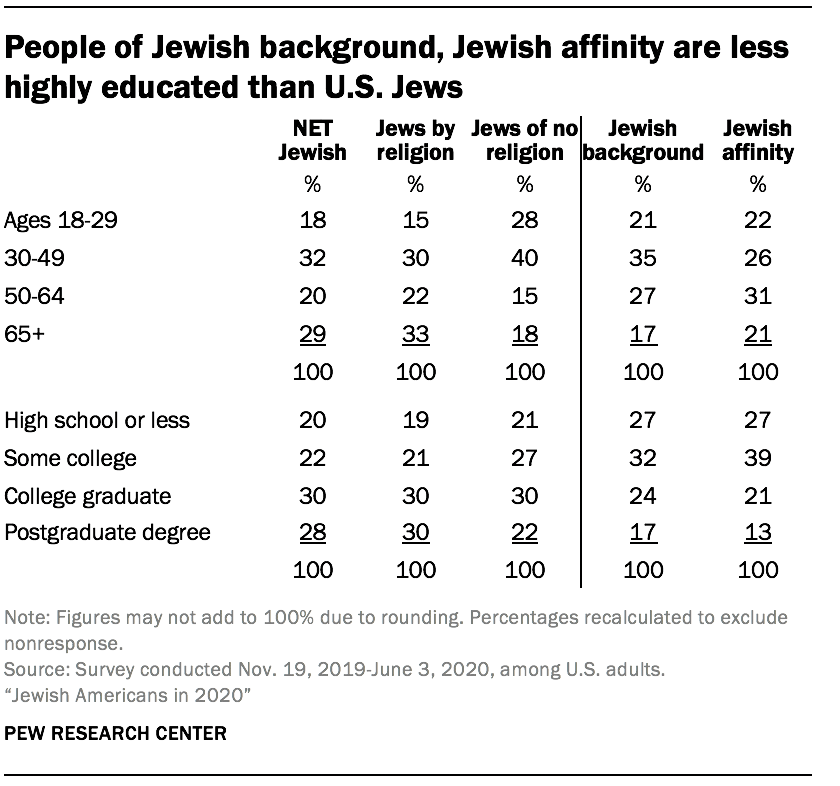
In their age profile, people of Jewish background tend to fall in between Jews of no religion (who are younger overall) and Jews by religion (who are older). For example, 56% of adults of Jewish background are under the age of 50, compared with 44% of Jews by religion and 68% of Jews of no religion in the same age group.
People of Jewish affinity are slightly older than those of Jewish background, on average, with 52% in the 50-plus category, including 21% who are at least 65.
Overall, people of Jewish background and Jewish affinity have less formal education than both Jews by religion and Jews of no religion. About four-in-ten respondents of Jewish background (41%) and one-third of people of Jewish affinity (34%) are college graduates. By contrast, larger shares of Jews by religion (60%) and Jews of no religion (53%) have college degrees.
Economic well-being
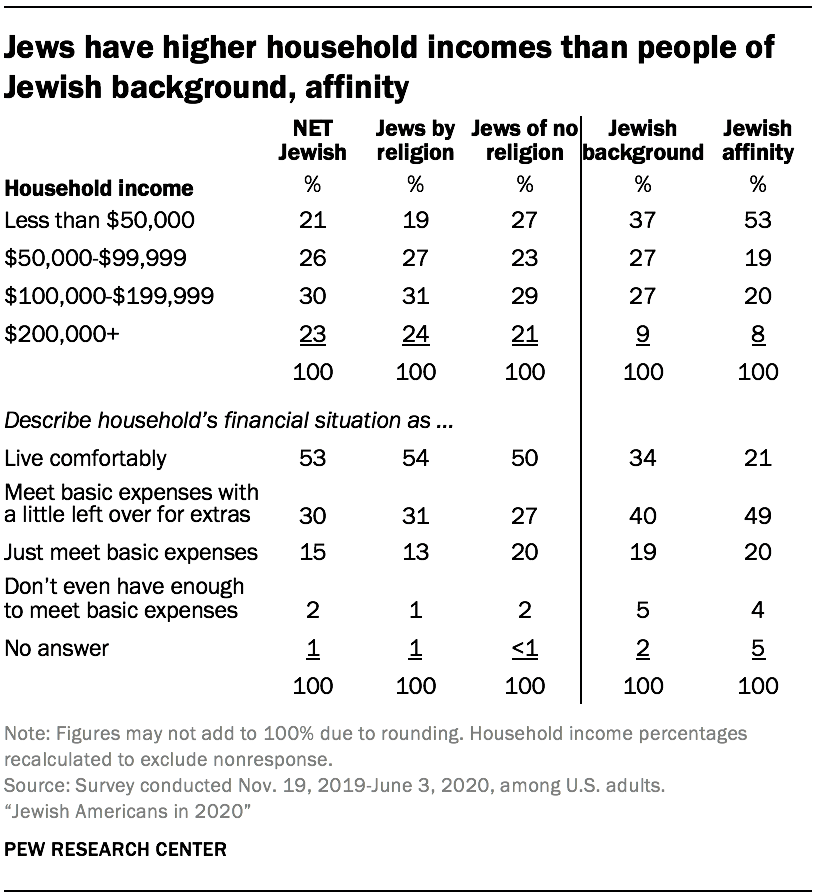
In line with their lower levels of education, people of Jewish background and people of Jewish affinity tend to have lower household incomes than Jewish Americans as a whole. While half or more of Jews by religion (54%) and Jews of no religion (50%) reported household incomes of $100,000 or more at the time of the survey, 36% of people of Jewish background and 28% of people of Jewish affinity said they belonged to households in that income category.
And when they were asked to describe their overall financial situation, just 34% of respondents in the Jewish background group and 21% of those in the Jewish affinity group said they live “comfortably,” compared with 50% Jews of no religion and 54% of Jews by religion who said the same.
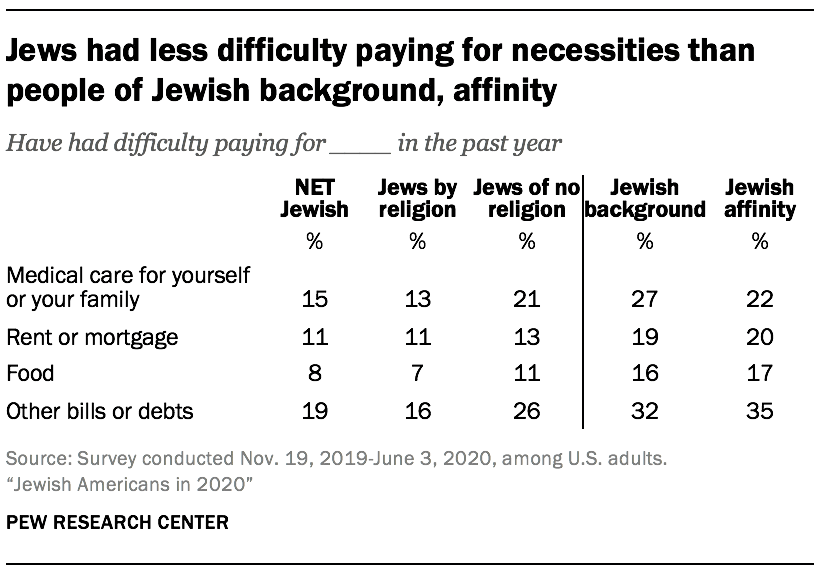
In addition, compared with U.S. Jews as a whole, larger shares of people of Jewish background and affinity reported having difficulty paying for necessities in the year before the survey was conducted (largely before the coronavirus pandemic).
For example, roughly one-in-five respondents of both Jewish background and Jewish affinity said they had difficulty paying for housing for themselves or their family in the previous 12 months, compared with 11% of U.S. Jews. (For more on the economic well-being of Jewish Americans, see Chapter 11.)




